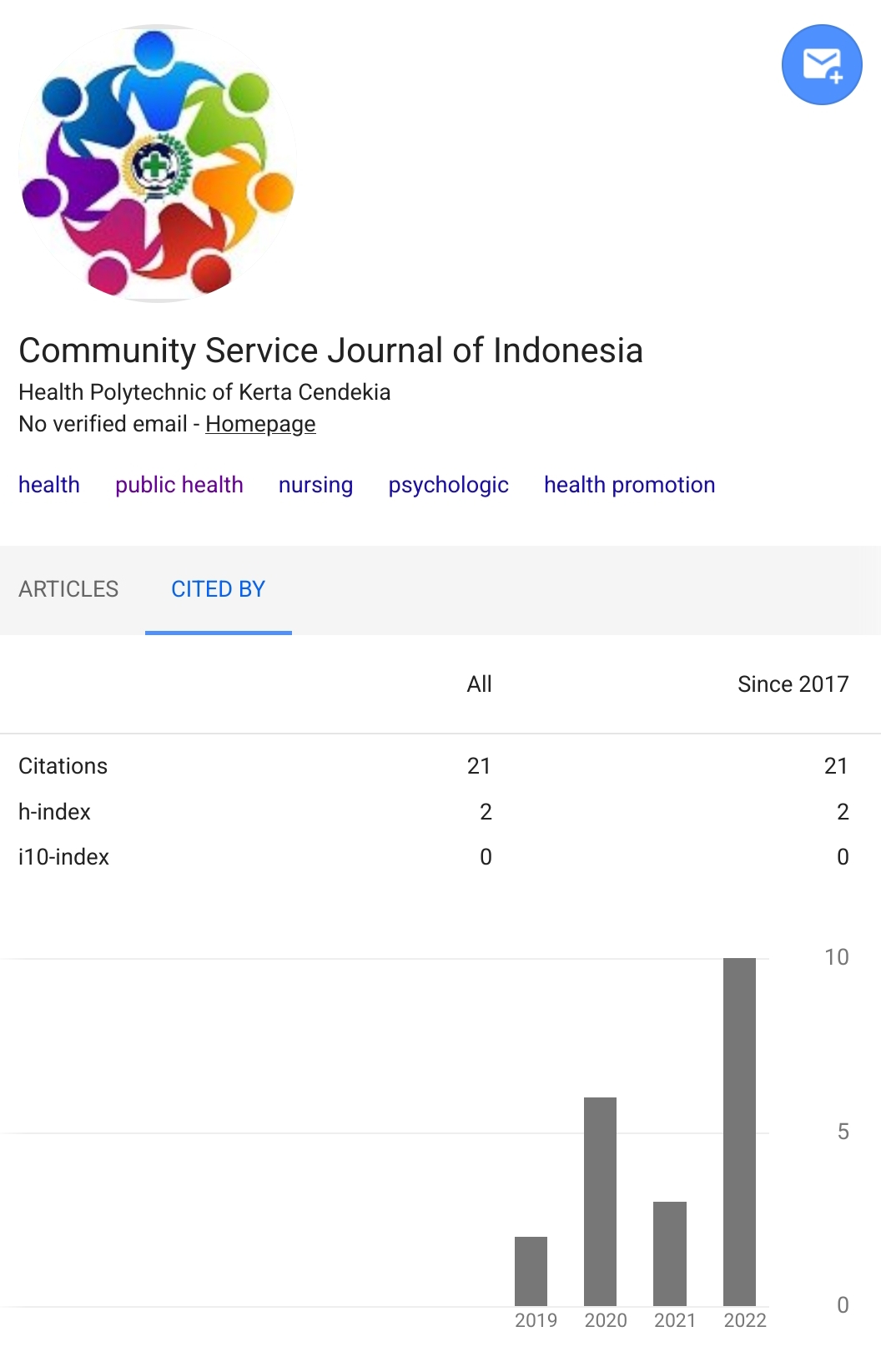SPIRITUAL EMOTIONAL FREEDOM TECHNIQUE AS A PROMOTIVE AND PREVENTIVE EFFORT IN PALLIATIVE CARE FOR PEOPLE WITH DIABETES MELLITUS
Abstract
Diabetes mellitus is a progressive disease that requires long treatment and large costs with various complications that can affect the physical, psychological and spiritual so promotive and preventive efforts are needed for palliative care that can improve the quality of life for people with diabetes mellitus. The purpose of this activity is to train health cadres and the community in increasing knowledge and how to carry out treatment with the Spiritual Emotional Freedom Technique as a promotive and preventive effort in palliative care for people with DM. The method used in this community service activity is to provide training and education on health services. This activity was carried out from April-May 2022 and was attended by 15 health cadres and 50 residents in RW 05, Wonokromo Village, Surabaya. The results show that the activity has achieved success according to the success indicators that have been set, namely 15 health cadres were successfully recruited; average attendance was 100%, participants participated enthusiastically, knowledge of cadres after training and residents after counseling increased significantly.References
Badan Penelitian dan Pengembangan, & Kementerian Kesehatan RI. (2018). Hasil Utama RISKESDAS. https://kesmas.kemkes.go.id/assets/upload/dir_519d41d8cd98f00/files/Hasil-riskesdas-2018_1274.pdf
Bettencourt-Silva, R., Aguiar, B., Sá-Araújo, V., Barreira, R., Guedes, V., Marques Ribeiro, M. J., Carvalho, D., Östlundh, L., & Paulo, M. S. (2019). Diabetes-related symptoms, acute complications and management of diabetes mellitus of patients who are receiving palliative care: a protocol for a systematic review. BMJ Open, 9(6), e028604. https://doi.org/10.1136/bmjopen-2018-028604 DOI: https://doi.org/10.1136/bmjopen-2018-028604
Chaghari, M., Saffari, M., Ebadi, A., & AMERYOUN, A. (2017). Empowering Education: A New Model for In-service Training of Nursing Staff. Journal of Advances in Medical Education & Professionalism, 5, 26–32.
Dunning, T. L. (2020). Palliative and End-of-Life Care: Vital Aspects of Holistic Diabetes Care of Older People With Diabetes. Diabetes Spectrum : A Publication of the American Diabetes Association, 33(3), 246–254. https://doi.org/10.2337/ds20-0014 DOI: https://doi.org/10.2337/ds20-0014
Faisal S. Hutapea, Mieke A.H.N. Kembuan, J. M. P. S. (2016). Gambaran klinis neuropati pada pasien diabetes melitus di Poliklinik. 4. https://ejournal.unsrat.ac.id/index.php/eclinic/issue/view/771 DOI: https://doi.org/10.35790/ecl.4.1.2016.12115
Gottlieb, B. H., & Bergen, A. E. (2010). Social support concepts and measures. Journal of Psychosomatic Research, 69(5), 511–520. https://doi.org/https: //doi.org/10.1016/j.jpsychores.2009.10.001 DOI: https://doi.org/10.1016/j.jpsychores.2009.10.001
Kalra, S., Jena, B. N., & Yeravdekar, R. (2018). Emotional and Psychological Needs of People with Diabetes. Indian Journal of Endocrinology and Metabolism, 22(5), 696–704. https://doi.org/10.4103/ijem.IJEM_579_17 DOI: https://doi.org/10.4103/ijem.IJEM_579_17
Kusnanto, K. (2016). Asuhan Keperawatan Klien Dengan Diabetes Mellitus: Pendekatan Holistic Care. Fakultas Keperawatan Universitas Airlangga.
Sari, R. Y., Muhith, A., Rohmawati, R., Soleha, U., Faizah, I., Afiyah, R. K., & Rahman, F. S. (2021). Spiritual Emotional Freedom Technique against Anxiety and Psychological Well-being of Type 2 DM Patients during the COVID-19 Pandemic. Open Access Macedonian Journal of Medical Sciences, 9(G), 260–265. DOI: https://doi.org/10.3889/oamjms.2021.7217
Van den Broucke, S. (2020). Why health promotion matters to the COVID-19 pandemic, and vice versa. In Health promotion international (Vol. 35, Issue 2, pp. 181–186). https://doi.org/10.1093/heapro/daaa042 DOI: https://doi.org/10.1093/heapro/daaa042
Wee, B. (2004). Oxford Textbook of Palliative Medicine. In Journal of the Royal Society of Medicine (Vol. 97, Issue 7, pp. 356–357). DOI: https://doi.org/10.1177/014107680409700720
Copyright (c) 2022 Ratna Yunita Sari, Nety Mawardah Hatmanti, Abdul Muhith, Imamatul Faizah, Evi Sylvia Awwalia, Riska Rohmawati

This work is licensed under a Creative Commons Attribution-NonCommercial 4.0 International License.
Authors who publish with Community Service Journal of Indonesia agree to the following terms:
- Authors retain copyright licensed under a Creative Commons Attribution-NonCommercial 4.0 (CC BY-NC 4.0), which allows others to remix, tweak, and build upon the authors' work non-commercially, and although the others' new works must also acknowledge the authors and be non-commercial, they don't have to license their derivative works on the same terms.
- Authors are permitted and encouraged to post their work online (e.g., in institutional repositories or on their website) prior to and during the submission process, as it can lead to productive exchanges, as well as earlier and greater citation of published work (See The Effect of Open Access). Authors can archive pre-print and post-print or publisher's version/PDF.













